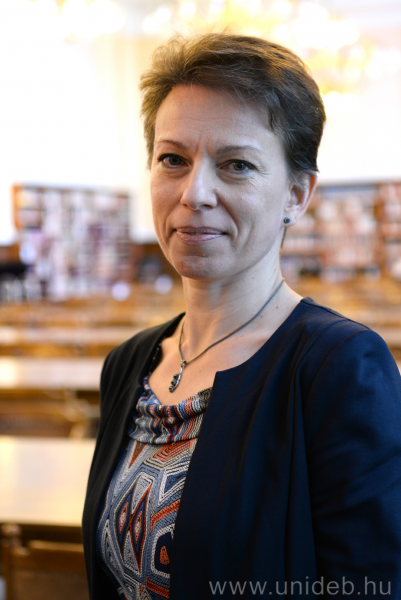- magyar
- english
- Русский
BOBCATSSS 2022, DEBRECEN

Gyöngyi Karácsony
Gyöngyi Karácsony is General Director at the University and National Library, University of Debrecen, Hungary. She has fifteen years of professional experience in scholarly communication, open access and open science. She represents Hungarian university libraries in a number of national and international projects and committees. She is president of the Association of University Directors in Hungary. She has participated in OpenAIRE and COAR as national contact point, and she was the coordinator of the HUNOR (Hungarian Open Access Repositories, www.open-access.hu) working group between 2008-2019. She is a member of the Open Science Working Group of the National Research, Development and Innovation Office responsible for creating a national policy on open science in Hungary. She is member of the governing board of HRDA, the Hungarian Research Data Alliance.
Gyöngyi Karácsony has extensive experience in coordinating electronic services, web service- and portal development, digitisation, and end-user training. Her current fields of interest and responsibility include open science, open education (facilitation and coaching techniques, training and skills development), human resources & capacities, research support, strategic planning, organisation culture and organisation development, quality management and workflow management, community building and social innovation. With her coordination and management, the university library has developed a CRIS-like system for the dissemination of scholarly output of the University of Debrecen (https://tudoster.idea.unideb.hu/en).
Titel of the Plenary presentation:
Dare to be Open: Transparency and Integrity in Science
Abstract:
The 21th century has brought a paradigm shift in research and scholarly communication. Each and every aspect of the research lifecycle has been soaked with the idea of openness since the Budapest Open Access Initiative (BOAI, 2002). Twenty years later, we are talking about open education, open research ecosystem, EOSC, FAIR data and citizen science. Most of the stakeholders’ experience, however, tells us about uncertainty, ambiguity and complexity – a feeling of being lost in the jungle.
Let us dive into the deepness of culture, and have a look at the research enterprise through the lenses of transparency and integrity – the driving values of openness in science.

Péter Baranyi
Péter Baranyi established the Cognitive Infocommunications concept around 2010. It is a scientific discipline today. It has an annual IEEE International Conference and a number of scientific journals special issues. If focuses on the new cognitive capabilities of the blended combination of human and informatics. He invented the TP model transformation that is a higher-order singular value decomposition of continuous functions. It has a crucial role in nonlinear control design theories and opens new ways for optimization. He is the inventor of MaxWhere that is the first 3D platform including 3D web, 3D browser, 3D store, and 3D Cloud. His research group published a number of journal papers firstly reporting that users get 40-50% better effectiveness in 3D digital environments. These results got a very high international impact within a few years. In 2019, he established a laboratory and research group at Széchenyi István University, which provides unique research opportunities internationally, and the per capita publication and citation are outstanding. From July 1, 2021, he is the Rector of Széchenyi István University.
Titel of the Plenary presentation:
Cognitive Infocommunications
Abstract:
Cognitive infocommunications (CogInfoCom, CogInfoCom.hu) investigates the link between the research areas of infocommunications and cognitive sciences, as well as the various engineering applications which have emerged as the synergic combination of these sciences. The primary goal of CogInfoCom is to provide a systematic view of how cognitive processes can co-evolve with infocommunications devices so that the capabilities of the human brain may not only be extended through these devices, irrespective of geographical distance but may also be blended with the capabilities of any artificially cognitive system. This merging and extension of cognitive capabilities are targeted towards engineering applications in which artificial and/or natural cognitive systems are enabled to work together more effectively.

Christian Wartena
Christian Wartena studied computational linguistics in Nijmegen (Netherlands) and Potsdam (Germany), where he received his doctorate in 1999. He worked for companies in Heidelberg (Germany) and Enschede (Netherlands) on machine translation, keyword extraction, information retrieval and knowledge transfer. Since 2011 he has been professor for language and knowledge processing at the Hochschule Hannover – University of Applied Sciences and Arts. He leads various projects in the field of natural language processing and has been the spokesman for the Smart Data Analytics research cluster since 2020.
Titel of the Plenary presentation:
Don’t be afraid of Artificial Intelligence: realistic expectations for information specialists
Abstract:
Artificial Intelligence (AI) allows algorithms to take over more and more tasks that previously have been done by knowledge workers. Especially, much of traditional work of librarians and other information specialists seems now to be subject to automation. Though AI has made a huge progress in the past decade, the intelligence ad possibilities of algorithms are still limited and not every task can be automated. Nevertheless, already now, AI is changing the working environment of information specialists and it will have even more impact in future: some traditional jobs for information scientists might become superfluous, but many new tasks arise: information technology needs information specialists itself.


